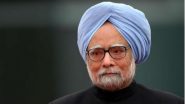Bucharest, Dec 11 (AP) Romania's pro-European parties agreed Wednesday to form a majority government made up of groupings that were traditionally on opposite sides and shutting out far-right nationalists who made significant gains in the election on Dec. 1.
Pro-Western parties won the most votes, with the leftist Social Democratic Party, or PSD, topping the polls. The PSD reached agreement late Tuesday to form a grand coalition with the center-right National Liberal Party, or PNL, the reformist Save Romania Union party, USR, and the small ethnic Hungarian UDMR party.
Also Read | Who Is Prahlad Iyengar, Indian-Origin PhD Scholar Suspended by MIT Over 'Pro-Palestine' Essay?.
The parliamentary election came hard on the heels of a presidential vote in which the far-right outsider Calin Georgescu won the first round. His surprise success plunged the European Union and NATO member country into turmoil as allegations of electoral violations and Russian interference emerged.
Days before the Dec. 8 presidential runoff, the Constitutional Court made the unprecedented move to annul the presidential race.
Also Read | Joe Biden Slams US President-Elect Donald Trump's Tariff Approach, Calls 'Action a Major Mistake'.
A statement from the new coalition said the parties would potentially support a “common pro-European candidate” in the new presidential elections. It isn't yet clear whether Georgescu will be allowed to run in the new vote.
President Klaus Iohannis, whose second term is set to expire later this month, said a new date for the rerun presidential election would be set once the new government has taken office. He signed a decree on Wednesday to convene parliament on Dec. 20.
"In the coming days, the four parties and the representatives of the national minorities will work on a joint governing program, focusing on development and reforms, while addressing the priorities of Romanian citizens,” the coalition statement said.
Elena Lasconi, the leader of USR who was set to face Georgescu in the annulled presidential runoff, said after the agreement was reached that “Romania is going through a very difficult” period and that cutting state spending and reducing bureaucracy would be part of the governing program.
In 2021, despite historically being Romania's two main opposition parties that have dominated post-communist politics, the PSD and the PNL formed an unlikely but increasingly strained coalition together with UDMR, which exited the Cabinet last year after a power-sharing dispute. (AP)
(This is an unedited and auto-generated story from Syndicated News feed, LatestLY Staff may not have modified or edited the content body)












 Quickly
Quickly

















